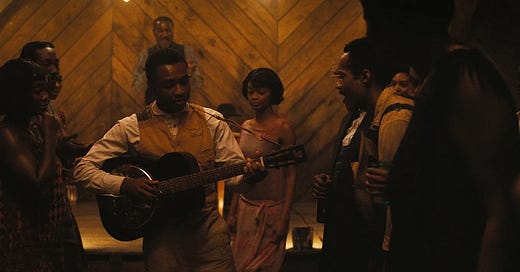Following the box office has become an increasingly popular (and controversial) hobby. Some movie fans, myself sometimes included, get preoccupied with a film’s opening weekend, “legs” (how it fares week to week), and budget vs. gross. There is a legitimate argument to be had that this is bad for film. But nevertheless, Sinners cannot be fully put in context without its box office. Most films drop about 45-60% in their second weekend. Sinners dropped 6%, making it the lowest non-holiday drop for a wide release ever. Cinemascore, which is the industry’s most reliable metric of audience opinion, gave the film an A, the highest for an R-rated horror film in around thirty years. Sinners is unprecedentedly successful, especially in an era of films going to on-demand or streaming within weeks of release. This all matters because something in the film has spoken to the culture. And unfortunately, this is not good news.
Michael B. Jordan stars in a dual role as identical twins Smoke and Stack who return to their hometown in Mississippi after a run-in with the Chicago mob goes bad. In an effort to get rich quickly, they decide to open up a juke joint, essentially a nightclub where blues is played. They enlist the help of young singer and guitarist Sammie (Miles Caton), alcoholic pianist Delta Slim (Delroy Lindo), and Smoke’s estranged wife Annie (Wunmi Mosaku) among others. However, what they don’t know is that a vampire (Jack O’Connell) is on the hunt for them.
The cast is all spectacular, especially Miles Caton who astonishingly is making his film debut. Caton is also a great singer and lifts up what is already one of the best soundtracks in recent memory. Sinners is unexpectedly a stealth musical with multiple full-on dance numbers, which are the absolute highlight. Coogler delivers a beautiful tribute to not only blues music, but several other genres. There is more to this aspect that I will leave unspoiled. If the critiques I will outline were non-existent, it would be worth watching just for these scenes.
Sinners is also very fun as a genre exercise. The third act reminded me a great deal of John Carpenter, especially Assault on Precinct 13 and The Thing. There is plenty of intense supernatural action to go around.
So despite these genuinely great aspects, Sinners fails, at least in the focus of this Substack. First, it is hard not to read the film as being anti-Christian. It depicts the faith as being a central part of oppressive colonialism. That critique is not without evidence but there is no nuance to balance it out besides a “religion is the opiate of the masses” take. Christianity is at worst the face of oppression and at best an ineffectual comfort.
In fact, I would argue that Coogler’s script is areligious and amoral. Smoke and Stack are unapologetically corrupt individuals. They made their fortune from the mob and shoot and kill without mercy. Adultery also plays a major role in the story and is not only tolerated but glorified. I hoped that the script would find redeeming qualities but it never did.
Without getting into specifics, Sinners is trying to tackle issues of cultural appropriation, communal memory, and trauma. We can choose to either find safety in an assimilation that destroys our cultural identity and risk violence at the hands of the dominant group. There is an interesting ambiguity here as the script does not give an answer. This tension between group safety and individual freedom is a fundamental part of life. Those are all potentially interesting topics to tackle but it is smothered in ick. The film proposes in the end that the only answer to violence is more violence. So in that way, it says a lot about our secularizing culture. Without the transcendent, there is only the will to power which ultimately ends in the annihilation of all.
The other, less significant problem with the film that annoyed me personally is Coogler’s application of some of the worst aspects of the Marvel formula. There is a lengthy and essential mid-credits scene that should have been part of the main film. A few plotlines also seem to exist only to set-up potential sequels, prequels, and spinoffs, even if they still fit into the broader metaphor. It is a mature filmmaking choice to drop the audience into a world in media res, but that can feel cheap here. Some of the character development is implied more than shown, which especially hurts one of the emotional payoffs at the end.
There is still a lot worth praising in Sinners but I cannot recommend it. Sinners is now playing in theaters.







Based on the mostly positive reviews, I was really looking forward to Sinners, even though I am not a horror fan. Because of the title, I was a little worried about what the film might say regarding Christianity. Unfortunately, it looks like my fears were warranted. Thank you for writing this article.